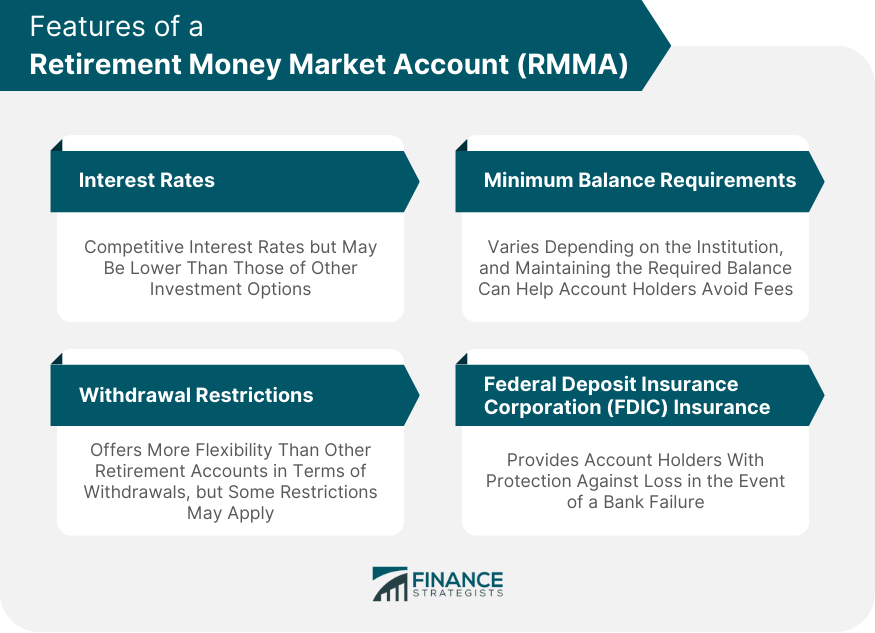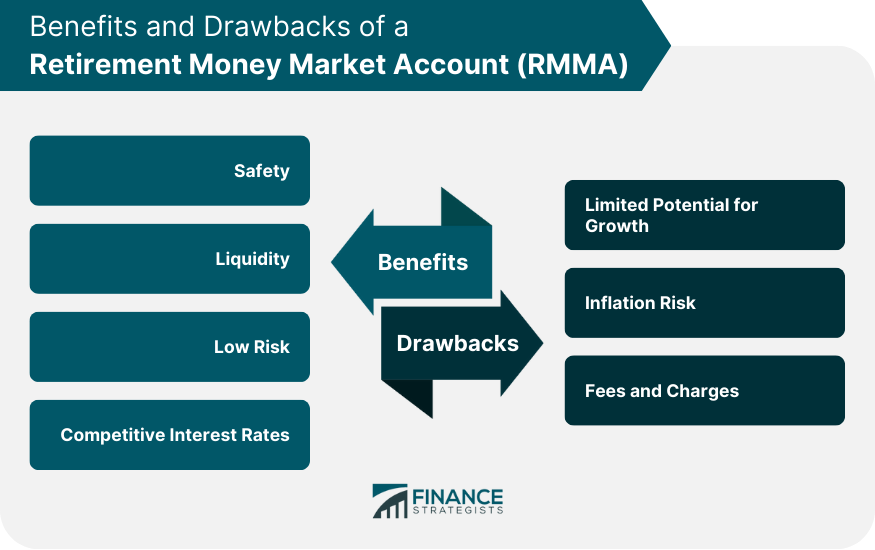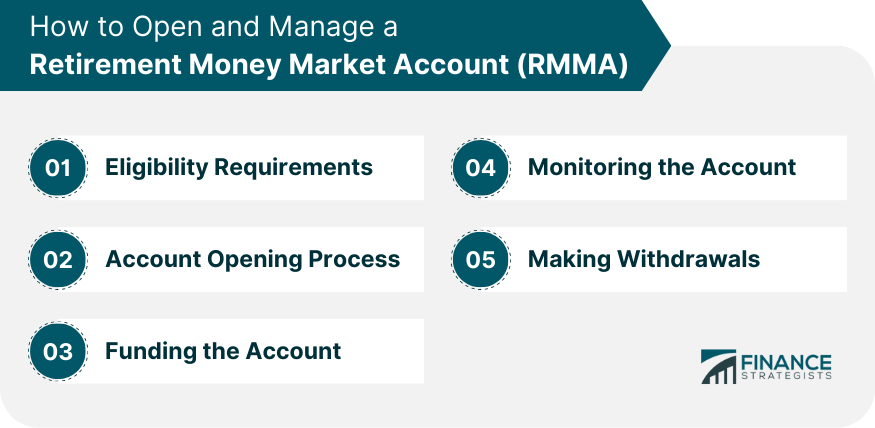A Retirement Money Market Account (RMMA) is a type of interest-bearing account designed specifically for retirement savings. It is similar to a traditional money market account but is tailored to provide more conservative and stable investment options for individuals saving for their retirement. RMMAs are typically offered by banks and credit unions, and other financial institutions. The primary purpose of an RMMA is to provide a safe and liquid investment option for those looking to save for retirement. These accounts offer a conservative approach to investing, allowing individuals to earn interest on their deposits while minimizing the risk of losing their principal. RMMAs can be an attractive option for those nearing retirement or seeking a low-risk, short-term investment vehicle for their retirement savings. RMMAs typically offer competitive interest rates compared to regular savings accounts. However, the rates may be lower than those of other investment options, such as stocks and bonds. Interest rates on RMMAs are variable and can change over time based on prevailing market conditions and the financial institution's policies. While RMMAs generally offer more flexibility than other retirement accounts in terms of withdrawals, some restrictions may apply. For instance, there may be a limit on the number of withdrawals allowed per month. Additionally, some institutions may impose fees for excessive withdrawals or require a minimum balance to avoid fees. Some financial institutions may require a minimum balance to open and maintain an RMMA. The minimum balance requirements can vary depending on the institution, and maintaining the required balance can help account holders avoid fees and maintain a competitive interest rate. RMMAs are typically insured by the Federal Deposit Insurance Corporation (FDIC) or the National Credit Union Administration (NCUA) for credit unions, providing account holders with protection against loss in the event of a bank failure. The standard insurance amount is $250,000 per depositor, per insured bank, for each account ownership category. One of the primary benefits of an RMMA is the safety it offers as an investment option. RMMAs are considered low-risk investments because they are insured by the FDIC or NCUA, protecting account holders' deposits up to the insurance limits. RMMAs provide a high level of liquidity, allowing account holders to access their funds relatively easily when needed. This feature can be particularly beneficial for those approaching retirement, as it offers the flexibility to withdraw funds without the penalties often associated with other retirement accounts, such as IRAs and 401(k) plans. RMMAs are considered low-risk investments due to their stable nature and the backing of the FDIC or NCUA. This can make them an attractive option for conservative investors or those looking to diversify their retirement portfolio with a low-risk component. Although interest rates on RMMAs may be lower than other investment options, they are generally more competitive than regular savings accounts. This allows account holders to earn interest on their deposits, contributing to their overall retirement savings. The conservative nature of RMMAs means that they may not provide the same level of potential growth as other investment options, such as stocks or mutual funds. This can be a disadvantage for those looking to maximize their retirement savings and generate higher returns over the long term. While RMMAs are considered low-risk investments, they may not always keep up with inflation, particularly during periods of high inflation. This can erode the purchasing power of the account holder's savings over time and may require individuals to consider other investment options to help protect against inflation risk. Some financial institutions may charge fees for maintaining an RMMA, including monthly maintenance fees, withdrawal fees, or fees for not meeting minimum balance requirements. These fees can eat into the interest earned on the account and may reduce the overall returns for account holders. A Traditional Individual Retirement Account (IRA) is a tax-advantaged retirement savings account that allows individuals to contribute pre-tax income. The contributions grow tax-deferred until withdrawal, at which point they are taxed as ordinary income. RMMAs differ from Traditional IRAs in that they offer greater liquidity and safety, but may provide lower returns due to their conservative nature. A Roth IRA is another type of tax-advantaged retirement savings account that allows individuals to contribute after-tax income. The contributions grow tax-free, and qualified withdrawals are also tax-free. While RMMAs provide more liquidity and safety than Roth IRAs, they may not offer the same tax benefits or potential for growth. A 401(k) plan is an employer-sponsored retirement savings plan that allows employees to contribute pre-tax income to their account. Employers may also offer matching contributions up to a certain percentage. RMMAs differ from 401(k) plans in that they are not employer-sponsored and may provide more flexibility in terms of withdrawals, but may not offer the same potential for growth or employer matching contributions. Social Security is a government-run program that provides retirement benefits to eligible individuals based on their work history and contributions. RMMAs are separate from Social Security and can provide additional retirement savings beyond the benefits received from the program. They offer more control over investment choices and the potential for higher returns, depending on the interest rates offered by the financial institution. There are typically no specific eligibility requirements to open an RMMA, although some financial institutions may have their own rules, such as minimum age or income requirements. It is essential to review the requirements and guidelines of the institution before opening an account. Opening an RMMA generally involves visiting the financial institution's website or branch, providing personal information, and meeting any minimum deposit or balance requirements. The process may vary depending on the financial institution, so it is crucial to research and compare different providers before choosing one. Once the RMMA is opened, account holders can fund the account through various methods, such as direct deposit, wire transfer, or transferring funds from another account. It is essential to ensure that the account meets any minimum balance requirements to avoid fees and maintain a competitive interest rate. Account holders should regularly monitor their RMMA, reviewing interest rates, fees, and account performance. This can help identify any potential issues or opportunities to maximize returns on the account. RMMAs offer the flexibility to make withdrawals when needed, subject to any restrictions imposed by the financial institution. Account holders should be aware of any fees or limitations on withdrawals to avoid penalties or other charges. A Retirement Money Market Account (RMMA) is a conservative and safe investment option designed specifically for retirement savings. It offers account holders the benefits of liquidity, low risk, and competitive interest rates compared to traditional savings accounts. RMMAs come with several features, such as variable interest rates, withdrawal restrictions, minimum balance requirements, and FDIC insurance. These features contribute to the overall appeal of RMMAs as a retirement savings option, but it is essential to consider individual financial goals and risk tolerance when evaluating whether an RMMA is the right choice. While RMMAs offer several benefits, such as safety, liquidity, and competitive interest rates, they also come with certain drawbacks, including limited potential for growth, inflation risk, and fees and charges. Account holders should carefully weigh the pros and cons of RMMAs in the context of their overall retirement planning strategy. Ultimately, an RMMA can be a valuable component of a well-diversified retirement portfolio, offering stability and security for those looking to minimize risk in their investments. What Is a Retirement Money Market Account (RMMA)?
Features of a Retirement Money Market Account
Interest Rates
Withdrawal Restrictions
Minimum Balance Requirements
FDIC Insurance

Benefits of a Retirement Money Market Account
Safety
Liquidity
Low Risk
Competitive Interest Rates
Drawbacks of a Retirement Money Market Account
Limited Potential for Growth
Inflation Risk
Fees and Charges

Comparison With Other Retirement Savings Options
Traditional IRA
Roth IRA
401(k) Plan
Social Security
How to Open and Manage a Retirement Money Market Account
Eligibility Requirements
Account Opening Process
Funding the Account
Monitoring the Account
Making Withdrawals

Final Thoughts
Retirement Money Market Account (RMMA) FAQs
A retirement money market account is a type of savings account designed for people to save for retirement while earning interest.
RMMA accounts typically offer higher interest rates, but with more restrictions on withdrawals and higher minimum balance requirements.
RMMA accounts provide a safe and low-risk investment option with competitive interest rates, along with the liquidity to access funds in case of emergency.
RMMA accounts are insured by the FDIC, so you will not lose your principal investment. However, inflation and fees can reduce the overall value of your investment.
To open an RMMA account, you will typically need to meet certain eligibility requirements, such as age and income. You can then apply for an account through a financial institution and fund the account to start earning interest.
True Tamplin is a published author, public speaker, CEO of UpDigital, and founder of Finance Strategists.
True is a Certified Educator in Personal Finance (CEPF®), author of The Handy Financial Ratios Guide, a member of the Society for Advancing Business Editing and Writing, contributes to his financial education site, Finance Strategists, and has spoken to various financial communities such as the CFA Institute, as well as university students like his Alma mater, Biola University, where he received a bachelor of science in business and data analytics.
To learn more about True, visit his personal website or view his author profiles on Amazon, Nasdaq and Forbes.











